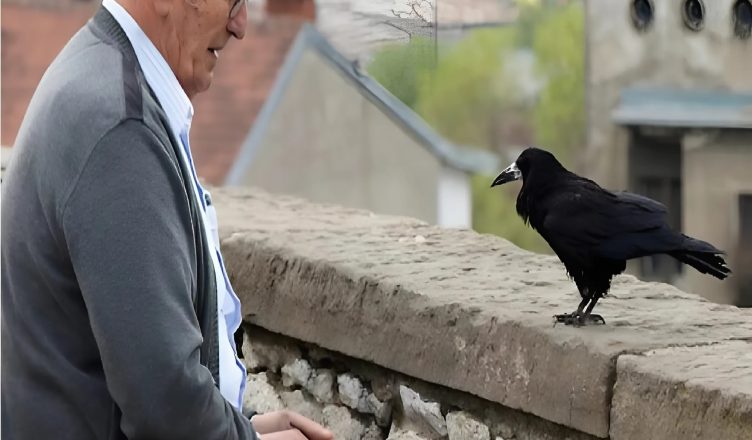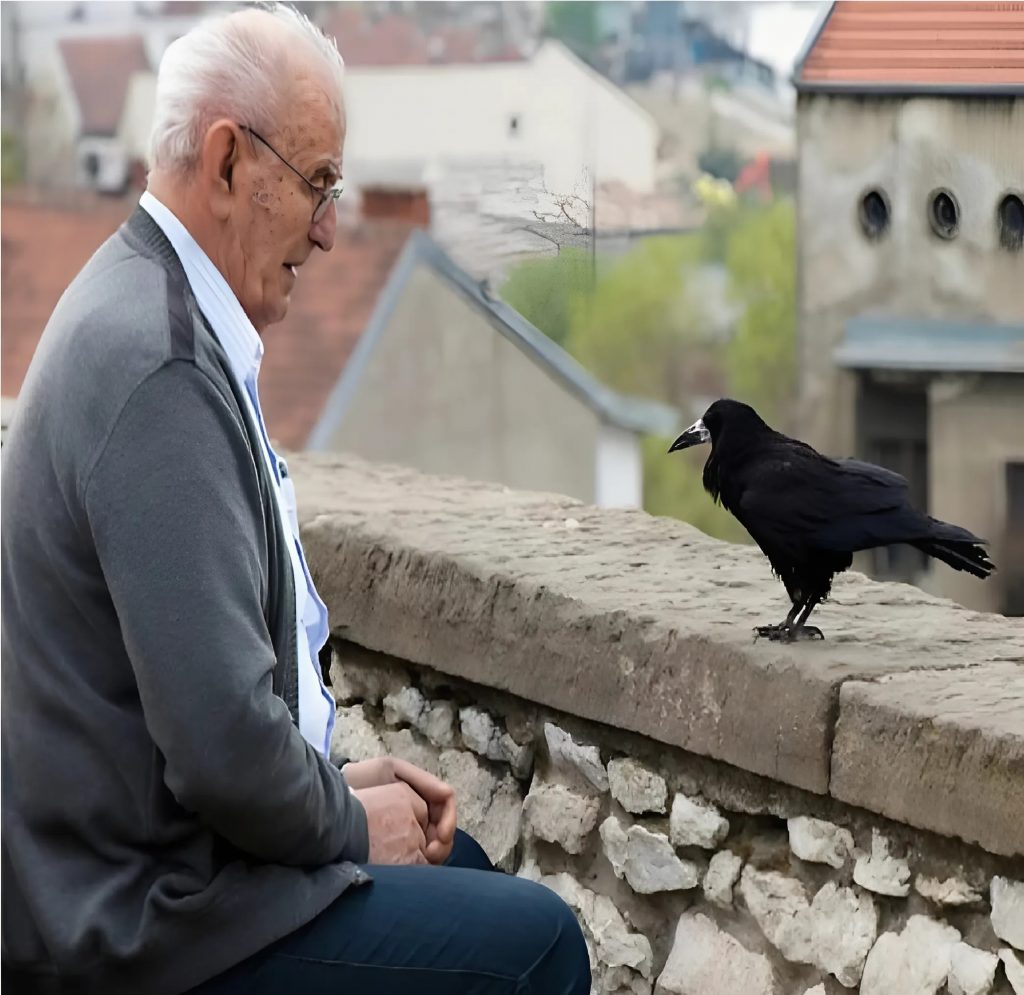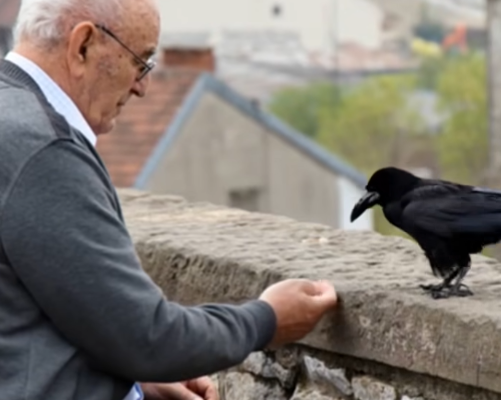It began as a quiet morning in late October, a morning like any other in the sleepy suburb where Thomas lived. Autumn had painted the leaves in shades of gold and rust, and the streets were scattered with crisp foliage underfoot. Thomas, a solitary man in his late sixties, had long retired from his job as a watchmaker. His days had settled into a rhythm of peaceful monotony: coffee at dawn, a walk around the neighborhood, some quiet reading, and tending to his modest backyard garden.
It was during one of these uneventful mornings that the crow first appeared.

Perched on the old oak tree that bordered his yard, the bird stared at him with eyes that seemed unusually intelligent, almost human. Its glossy feathers glistened in the morning sun. Crows were not uncommon in the area, but this one was different. It didn’t caw or fly away when he approached. It simply watched.
Out of curiosity and perhaps a touch of boredom, Thomas tossed a small piece of bread onto the grass. The crow hesitated, then hopped down, grabbed the morsel, and took off.
The next day, it returned.
And the next.
What started as a casual feeding turned into a daily routine. Every morning, Thomas would set out bits of food—sometimes bread, sometimes fruit, occasionally scraps from his own meals—and the crow would swoop in without fail. Eventually, it stopped waiting for Thomas to leave. It perched closer, watched him from the fence, even made soft chattering sounds as if trying to communicate.
Thomas began to talk to it.

He told the crow about his wife, who had passed two years ago. About his daughter, who now lived across the country and rarely visited. About the days when he would fix delicate timepieces with trembling yet precise hands. The crow never responded, of course, but there was a strange comfort in speaking to something that listened so attentively.
Then came the winter, and Thomas worried the bird might not return. But the crow appeared, even through snow and biting wind. It came when the skies were gray and silent, when even squirrels had hidden away. It stayed, faithfully, as if tethered by some invisible thread of understanding.
By spring, Thomas had given the bird a name: Edgar.
They had settled into a strange companionship—one man and one crow, sharing time and silence. Thomas sometimes laughed at himself, an old man befriending a bird. Yet he looked forward to Edgar’s visits more than anything else. The world had become small, and Edgar brought with him a sliver of something else—mystery, perhaps even magic.
It was on the first day of October, exactly one year after their strange friendship had begun, that Edgar brought something more.
That morning, Thomas opened his door to find Edgar already waiting on the fence. But this time, the bird was not alone. Clutched in its beak was a small, shiny object. Edgar hopped forward and dropped it at Thomas’s feet before flying to the tree above.
Thomas stooped down and picked it up.
It was a key.
Not just any key—a beautifully ornate one, unlike any he had ever seen. Brass, with intricate engravings curling around its bow, and a curious symbol etched near the teeth: an hourglass surrounded by feathers.
His hands, now slightly arthritic, trembled as he turned the key over. Where could it possibly belong?
For the rest of the day, he couldn’t shake the feeling that the key meant something. That night, he dreamt of locks and ticking clocks, of doors in his house he had never noticed before.
The next morning, Edgar was back. And this time, he was insistent. The bird fluttered, cawed softly, then flew off a short distance—only to return, as if urging Thomas to follow.
He did.
Through his backyard, down a forgotten path that bordered the woods, Edgar led him to a place Thomas hadn’t walked in years: the abandoned shed that had once belonged to his grandfather. It had always been padlocked shut, untouched since the man’s death decades ago.
Except now, the rusted lock seemed almost to glimmer in the sunlight.
With hesitant hands, Thomas took out the key and inserted it into the lock. It turned smoothly.
Inside the shed was dust, decay—and something else.
A wooden chest. Inside it, letters, photographs, a journal, and an envelope addressed in his grandfather’s handwriting: To be opened when the time feels right.
With Edgar watching silently from the window, Thomas sat on the creaking floor and read.
The letter spoke of family secrets, of lost time, of love and regret. It told stories of Thomas’s childhood, of his mother’s early life, of treasures both literal and emotional that had been tucked away, waiting. Among the papers was a deed to a parcel of land in Scotland—a place Thomas had only heard whispered about in family lore. There were photographs of people who looked like him, a whole side of his history that had faded into silence.
Thomas felt something shift inside him. For the first time in years, perhaps decades, he felt a spark of wonder.



